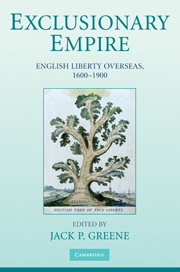Book contents
- Frontmatter
- Contents
- Notes on Contributors
- Preface
- Introduction
- 1 The Languages of Liberty in British North America, 1607–1776
- 2 Liberty and Slavery
- 3 “Era of Liberty”
- 4 Liberty and Modernity
- 5 Federalism, Democracy, and Liberty in the New American Nation
- 6 Liberty, Order, and Pluralism
- 7 Contested Despotism
- 8 “… a bastard offspring of tyranny under the guise of liberty”
- 9 How Much Did Institutions Matter?
- 10 The Expansion of British Liberties
- Index
5 - Federalism, Democracy, and Liberty in the New American Nation
Published online by Cambridge University Press: 05 June 2012
- Frontmatter
- Contents
- Notes on Contributors
- Preface
- Introduction
- 1 The Languages of Liberty in British North America, 1607–1776
- 2 Liberty and Slavery
- 3 “Era of Liberty”
- 4 Liberty and Modernity
- 5 Federalism, Democracy, and Liberty in the New American Nation
- 6 Liberty, Order, and Pluralism
- 7 Contested Despotism
- 8 “… a bastard offspring of tyranny under the guise of liberty”
- 9 How Much Did Institutions Matter?
- 10 The Expansion of British Liberties
- Index
Summary
British subjects in the provinces that would form the United States of America shaped their societies in the image of the metropolis. As they adapted to their distance from Britain and to distinctive environmental conditions, colonists understood that provincial societies deviated from the metropolitan standard. Sometimes, their “exceptional” circumstances – most notably, the extraordinary availability of productive land – worked to the advantage of the generality of white householders: This was “the best poor man's country,” characterized by what Benjamin Franklin described as a “happy Mediocrity.” Yet, as provincial patriots were acutely aware, their provinces were also fundamentally defective and incomplete. That ultimate authority lay elsewhere underscored this incompleteness, for in both a symbolic political sense and in a very real economic sense, Anglo-Americans depended on the metropolis. Far from being “terminal polities,” autonomous and independent in fact if not theory, the American provinces were fragmentary projections of metropolitan power and interest. Without the imperial connection, Anglo-Americans would not have developed a sense of provincial or transprovincial, “continental” identity; without metropolitan markets these provinces – and, of course, their successor states – would not even exist.
Provincial Americans first conceived of the British empire as an inclusive transatlantic political community in which all subject-citizens enjoyed equal rights. Long before Thomas Jefferson and his congressional colleagues claimed a “separate & equal station … among the powers of the earth,” provincials claimed membership in an empire of equals. But equality did not mean independence.
- Type
- Chapter
- Information
- Exclusionary EmpireEnglish Liberty Overseas, 1600–1900, pp. 132 - 159Publisher: Cambridge University PressPrint publication year: 2009
- 2
- Cited by



